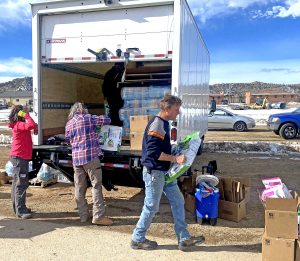by Sharon Niederman
RATON — The Oct. 19, 2020 meeting of the Raton Board of Education presented more problems than solutions as the board continued to grapple with deferred maintenance of the school system’s technology needs, changing requirements of the NM’s Public Education Department, unfunded mandates, and general frustration over limitations placed on students due to the pandemic.
The meeting opened with a lengthy question and answer session with the board’s financial adviser, John Archuleta, and legal counsel, Patricia Ives, regarding the logistics of drawing down newly available funds from education technology and general obligation bonds.
Ives detailed proper procedure for the acquisition of purchases of Chromebooks and other tech equipment consistent with state requirements from the $850,000 bond. At a cost of $39,112 over ten years, the loan from the NM Finance Authority is considered quite favorable, and the mill levy for the 2020 tax year will not go up.
Computers to be used by teachers will cost $170,000, while money will be saved through the substitution of televisions for projectors in classrooms. General obligation bond funds may be spent for equipment to be used by students, Ives clarified.
Raton High School principal LeAnne Montoya reported that occupational and vocational classes will be moved to a later date due to current conditions. Looking ahead, superintendent Christopher Bonn said developing classes in agricultural science, culinary management and hotel-motel management would be possible. In fact, he envisioned students operating a local motel as a prototype.
Regarding current COVID-safe guidelines from the state, Bonn said, “We’re running a good ship, but we have no backup. We can’t combine classrooms.” Concerns center on management, in case the governor shifts away from the current 9:1 student-teacher ratio, to a 5 to 1 or 4 to 1 ratio. “We don’t have staff,” Bonn said. He also voiced concerns regarding meal delivery. “We must deliver meals,” he said, citing federal dollars received to do so.
Another burden on small school districts is the mandate to install a very expensive filtration system that the state will not reimburse. And in attempting to comply with state rules, “We’re stuck with shields we can’t use,” says Bonn, as well as a large quantity of foaming sanitizer. RPS received $290,000 in CARES Act money, but needs such as an outmoded tech infrastructure could easily eat that up. “The $850,000 in tech bonds won’t make a dent,” Bonn said.
Board president Jason Phillips asked, “What will it take to make us proficient and operational?” and “What will it take for our kids to go back to school?”
He worried that distance learning is limiting students socially and emotionally.
The burden on teachers who must spend eight hours teaching and eight hours doing data entry is too heavy. “Teachers are gatekeepers of body, mind and soul,” Phillips said. He anticipated that students are going to fall “two years behind” as a result of current circumstances. Tech issues on top of learning frustrations make life difficult for students and teachers.
“My staff is doing a phenomenal job,” Bonn said.
The board approved a $1,200 stipend for an individual at each site “above and beyond” to help teachers with tech issues and those having problems with the Canvas learning program.
Technology advisors Ainsworth and Sanchez of Plan B Networks, Inc. accepted the board-recommended maintenance contract. They then reported on several tech infrastructure and connectivity issues that were in “dire need” of replacement, including switches that had already reached “end of life,” and a ten year-old unsupported telephone system. They said there was no backup in the case of disaster recovery and the 15-20 year old paging system is a safety concern, as well as the need for more bandwidth.
Bonn suggested putting out a re-authorization of the bond in three years.




